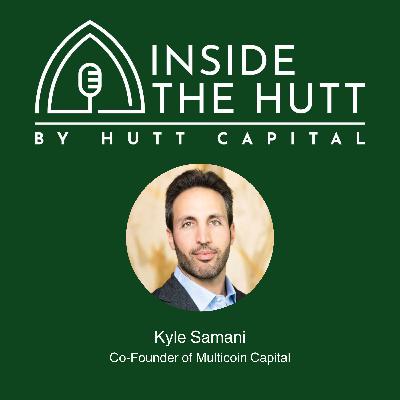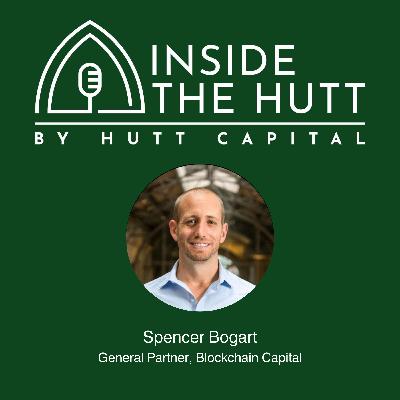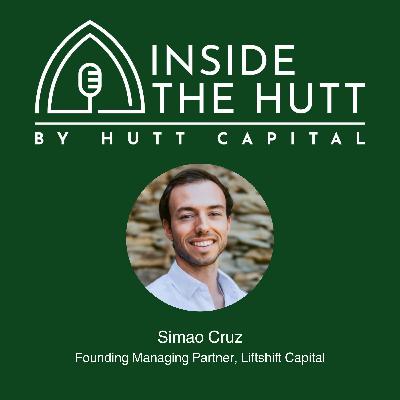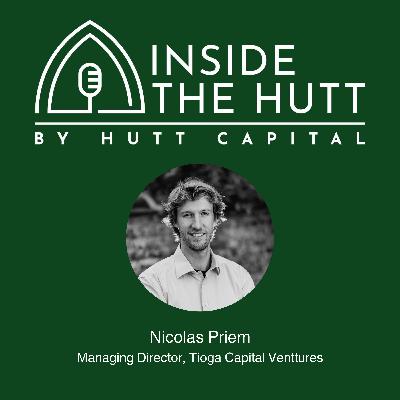Discover Inside the Hutt
Inside the Hutt

Inside the Hutt
Author: Hutt Capital
Subscribed: 1Played: 1Subscribe
Share
© Copyright 2025 Hutt Capital
Description
Hosted by Brooke Pollack, Managing Partner of Hutt Capital, join “Inside the Hutt” as we talk with leading blockchain venture capital investors to discuss their origins, investment approaches, recent trends, and how they’re navigating this complex industry. Inside the Hutt provides invaluable insights for crypto enthusiasts and investment professionals alike.
Want to learn more about Hutt Capital and the show? Visit www.huttcapital.com
Want to learn more about Hutt Capital and the show? Visit www.huttcapital.com
35 Episodes
Reverse
In this episode of Inside the Hutt, Brooke Pollack speaks with Jesse Walden, founder of Variant, a seed-stage crypto investment firm. Jesse shares his journey from founding Mediachain to launching Variant, highlighting his focus on the ownership economy and regulatory clarity in crypto. He explains Variant’s barbell strategy of early-stage and liquid investing, insights on vertical integration, and their team’s legal-forward approach. Jesse also covers evolving opportunities in DeFi, NFTs, and why he believes crypto is still early in its adoption cycle—especially in the U.S. market.Key Points From This Episode:Jesse Walden’s background, founding Mediachain, and transition from Spotify to A16Z.Founding Variant and its origin as a seed-focused crypto fund with a distinct ownership thesis.Variant’s evolution, team structure, and strategic decision to remain lean.Importance of legal and regulatory infrastructure, including internal policy expertise.Original ownership economy thesis and how it’s held up over time.Regulatory shifts in the U.S. and potential impact of the market structure bill.Founder behavior in anticipation of upcoming SEC rulemaking.Liquidity strategies and long-term approach to token investments.Current investment themes across DeFi, infrastructure, AI, and consumer.Investment logic behind L1s and L2s, and vertical integration trends.Thoughts on corporate players launching blockchains (Stripe, Coinbase, etc.).Investment in Blockaid and the opportunity in crypto security.Hype vs. reality in categories like prediction markets and stablecoins.Why DeFi remains underappreciated despite stablecoin traction.Long-term vision for NFTs and their infrastructure layer role.Jesse’s views on competition, Variant’s positioning, and platform differentiation.Ongoing importance of policy support even with regulatory clarity.LinksJesse Walden on LinkedIn: https://www.linkedin.com/in/jessewalden Variant: https://variant.fund/ Brooke Pollack on X: https://x.com/bhpollack Brooke Pollack on LinkedIn: https://www.linkedin.com/in/brookepollack/ Hutt Capital: https://www.huttcapital.com/
In this episode of Inside the Hutt, Brooke Pollack welcomes back Joe Eagan, co-founder of Anagram and the podcast’s very first guest. Joe shares how Anagram has evolved from a two-person operation to a 25-person holding company and crypto venture platform. He explains their build-first strategy, the firm’s emphasis on composable synergy between building and investing, and the structure behind their asset management arm. Joe also discusses recent spin-outs like Glider, Swig, and Breeze, reflects on the firm's approach to engineering-led ideation, and addresses the growing role of Solana within their portfolio. The conversation closes with thoughts on crypto treasury plays, regulatory shifts, and the firm’s outlook as a holding company with permanent capital.Key Points From This Episode:Joe Eagan’s background and the early days of Anagram.Anagram’s thesis: pairing human and financial capital for crypto investing and building.Structure of Anagram’s 25-person team, including asset management, investment, engineering, building, and talent teams.The evolution of Anagram’s internal build process and emphasis on rapid iteration.Overview of projects like Glider, Swig, Breeze, and the firm’s Solana validator.Strategy behind internal product development and its relation to supporting portfolio companiesThe value of engineering-led ideation and bottoms-up product creation.Examples of internal tools and spin-outs powering Anagram’s flywheel.Role of Lily Liu as co-founder and her involvement with Solana Foundation.Why Anagram remains chain-agnostic despite a strong Solana footprint.Overview of Anagram Asset Management and its three crypto-focused funds.Unique structure of short-duration, niche venture funds to match crypto’s pace.How Anagram Liquid Ventures mirrors its venture strategyThe rationale behind running a holding company instead of a traditional VC fund.Joe’s thoughts on long-term investor adoption and why skepticism still exists.LinksJoe Eagan on LinkedIn: https://www.linkedin.com/in/joseph-eagan-22531577Anagram: https://www.anagram.xyzAnagram on X: https//x.com/@anagramxyzBrooke Pollack on X: https://x.com/bhpollack Brooke Pollack on LinkedIn: https://www.linkedin.com/in/brookepollack/ Hutt Capital: https://www.huttcapital.com/
In this episode of Inside the Hutt, Brooke Pollack interviews Serge Kassardjian, co-founder of Sixth Man Ventures. Serge recounts his journey from early stints at Google and Sony to founding StayTuned and later co-launching Sixth Man Ventures. He discusses the firm’s investment focus on crypto applications, their early conviction in NFTs and Solana, and how the team approaches building with founders. Serge also unpacks market trends, token and equity dynamics, and the evolving sophistication of crypto founders, while offering insight into standout portfolio companies like Pump.fun and Sleepagotchi. Key Points From This Episode: Serge Kassardjian’s background and path from Google and Sony to founding StayTuned and Sixth Man Ventures. How Sixth Man Ventures began with NFT trading and a small experimental wallet fund. The firm’s focus on application-layer investments in both consumer and enterprise crypto use cases. Why Sixth Man Ventures is chain-agnostic, despite early success in the Solana ecosystem. Strategy around liquid token investments and preference for long-term theses over short-term trading. Views on opportunities beyond financial use cases, including gaming, DePIN, collectibles, and RWAs. Approach to evaluating projects like Pump.fun and conviction-driven investing. Thoughts on the current state of the crypto venture market and signs of increasing regulatory clarity. Comparison between crypto VC and traditional VC in terms of liquidity, M&A, and overall returns. Perspective on investing across tokens and equity and the impact of IPO and token unlock trends. Serge’s investment focus areas within the firm, including speculative apps, content, and gaming. Insights into portfolio companies Sleepagotchi and Hogg, and their novel approaches to crypto use. Why disciplined capital deployment and founder-fit remain key differentiators for Sixth Man Ventures. Observations on founder quality in crypto and evolving investor behavior in the space. Serge’s alternate dream career: basketball podcaster. Links Serge Kassardjian on X: https://x.com/sergekass Serge Kassardjian on LinkedIn: https://www.linkedin.com/in/sergekass/ Verda Ventures: https://6thman.ventures/ Brooke Pollack on X: https://x.com/bhpollack Brooke Pollack on LinkedIn: https://www.linkedin.com/in/brookepollack/ Hutt Capital: https://www.huttcapital.com/
In this episode of Inside the Hutt, Brooke Pollack interviews Alex Witt, founding general partner of Verda Ventures. Alex shares his path from traditional finance and crypto mining in China to launching Verda, a stablecoin infrastructure fund focused on emerging markets. The discussion explores Verda’s strategic partnerships with Tether and MiniPay, the evolving role of stablecoins in cross-border payments, and how regulatory developments and geopolitical dynamics are shaping the future of stablecoin adoption.Key Points From This Episode:Alex Witt’s background in traditional finance and early crypto ventures in ChinaHis transition to Silicon Valley and the founding of Verda Ventures and APFVerda’s focus on stablecoin infrastructure in emerging marketsStrategic partnerships with Tether and MiniPay to support portfolio companiesThe utility and impact of stablecoins in cross-border commerce and remittancesDifferences in stablecoin adoption across the U.S., Europe, and the Global SouthRationale for USD dominance and expectations for non-USD stablecoin growthHow stablecoins support U.S. dollar dominance and treasury demandInvestment opportunities in stablecoin infrastructure and cross-border railsRegulatory clarity in the U.S. and its implications for Circle and big banksOutlook on Ethereum as the foundational blockchain for stablecoinsRole of Tether and MiniPay in Verda’s investment and growth strategyFuture trends in stablecoin adoption: FX usage and private B2B transactionsGeopolitical implications of stablecoin use in unstable currency regionsProjections for global stablecoin supply over the next decadeMarket impact of Circle’s IPO and Stripe’s stablecoin-related M&A activityExit dynamics and acquisition appetite from major fintechs and banksAlex’s hypothetical career path outside crypto and techLinksAlex Witt on X: https://x.com/alexlwitt Alex Witt on LinkedIn: https://www.linkedin.com/in/alexwitt Verda Ventures: https://verda.ventures/ Brooke Pollack on X: https://x.com/bhpollack Brooke Pollack on LinkedIn: https://www.linkedin.com/in/brookepollack/ Hutt Capital: https://www.huttcapital.com/
In this episode of Inside the Hutt, Brooke Pollack interviews Jason Kam, founder of Folius Ventures. Jason shares his journey from traditional finance to launching a hybrid crypto hedge fund, focusing on both liquid and private investments with a strong presence in Asia. He explains the structure of Folius, his evolving views on fund models, the importance of flexibility in crypto investing, and the challenges of navigating the Asian founder landscape. Jason also introduces BidClub, a platform to improve idea-sharing and transparency in liquid token investing.Key Points From This Episode:Jason Kam’s background in investment banking and hedge funds before entering crypto.The launch of Folius Ventures and its hybrid fund structure.Why Jason prioritized APAC and Chinese founders for early investments.The rationale behind Folius’ mix of liquid and private investments.Views on the advantages of a permanent capital or HoldCo structure in today’s market.Jason’s approach to diligence for liquid vs. private crypto investments.Observations on crypto regulatory landscapes in Asia and challenges for Chinese founders.Sectors Folius is focused on: trading, stablecoins, and asset issuance.Discussion on token governance, transparency, and long-term fundamentals in liquid markets.Overview of BidClub and its role in surfacing investment ideas for liquid tokens.LinksJason Kam on LinkedIn: https://hk.linkedin.com/in/jason-kam-35080625Folius Ventures: https://www.folius.ventures/BidClub: https://www.bidclub.io/ Brooke Pollack on Twitter: https://twitter.com/bhpollackBrooke Pollack on LinkedIn: https://twitter.com/bhpollackHutt Capital: https://www.huttcapital.com/Jason Kam on Twitter: https://twitter.com/MapleLeafCapBidClub on Twitter: https://twitter.com/BidClubio
In this episode of Inside the Hutt, Brooke Pollack speaks with Andy Kangpan, co-founder of Metalayer Ventures. Andy shares his journey from ff Venture Capital and Two Sigma to founding Metalayer, a firm focused on the future of finance moving on-chain. The conversation explores Metalayer’s investment thesis, the evolving crypto infrastructure landscape, and what Andy believes are the most exciting opportunities across stablecoins, market infrastructure, and asset tokenization. He also discusses the firm’s data-driven sourcing platform, founder support strategy, and broader views on DeFi and blockchain adoption.Key Points From This Episode:Andy Kangpan’s career path from ff Venture Capital to Two Sigma and into crypto.The origins of Metalayer Ventures and its spinout from Two Sigma.Metalayer’s thesis: the global financial system will be on-chain within the next decade.Breakdown of Metalayer’s three investment categories: market infrastructure, stablecoins, and tokenized assets.Rationale behind early-stage equity and token investments in crypto.Evolution of exit opportunities for equity-based crypto businesses.Regulatory improvements accelerating institutional crypto adoption.In-depth analysis of stablecoin investment categories and use cases.Challenges and opportunities in crypto market infrastructure.Comparison of competition dynamics across stablecoins and infrastructure.Insights into real-world asset tokenization, especially in private credit.Metalayer’s approach to investing in DeFi and institutional-focused protocols.Blockchain ecosystems gaining traction among financial institutions (Ethereum, Solana, Avalanche).Metalayer’s data-driven sourcing engine, Morai, and how it supports the investment process.What differentiates Metalayer as a capital partner for founders.Geographic investment focus by category across the Metalayer portfolio.Highlight of Station 70, a recent investment in digital asset security infrastructure.Andy’s past ambition to become a professional skateboarder and his continued passion for skating.LinksAndy Kangpan on Twitter: https://x.com/kangpandabearAndy Kangpan on LinkedIn: https://www.linkedin.com/in/andrewkangpanMetalayer: https://www.metalayer.vc/Brooke Pollack on Twitter: https://twitter.com/bhpollackBrooke Pollack on LinkedIn: https://twitter.com/bhpollackHutt Capital: https://www.huttcapital.com/
In this episode of Inside the Hutt, Brooke Pollack welcomes Sam Hallene, investment partner at CMT Digital, a blockchain-focused venture capital firm operating under the broader CMT Group. Brooke and Sam explore current trends in DeFi, stablecoins, DePIN and sector-specific blockchains, along with candid insights into founder relationships, portfolio construction, and long-term conviction in the industry.Key Points From This Episode:Sam’s background and how he joined CMT Digital after reading the Bitcoin and Ethereum white papers.Overview of CMT Digital’s evolution and its relationship with the broader CMT Group.CMT Digital’s venture strategy, early-stage focus, and investment approach.The operational implications of being a registered investment advisor (RIA).CMT’s generalist thesis in blockchain, spanning multiple verticals and geographies.Observations on the potential for U.S. crypto re-onshoring and regulatory shifts.CMT’s global footprint and approach to investing across jurisdictions.Investment check size, ownership targets, and CMT’s long-term founder engagement strategy.Current state of DeFi and its progression into new financial instruments and integrations.Stablecoins as a transformational technology and investment opportunity.Perspectives on credit infrastructure and the role of stablecoins in payments.1Money as an example of a purpose-built stablecoin-centric blockchain.CMT’s views on investing across multiple L1s and L2s and how they think about competitive overlap.Discussion of portfolio company Strike and the enduring demand for Bitcoin-centric financial services.Thoughts on DePIN and key takeaways from Andrena’s growth model.Sam’s conviction that global finance and infrastructure will shift to blockchain rails.Why founders and LPs choose to work with CMT Digital.Links:Sam Hallene on LinkedIn: https://www.linkedin.com/in/sam-hallene-353650bbCMT Digital: https://cmt.digital/CMT Digital on Twitter: http://twitter.com/cmt.digital Brooke Pollack on Twitter: https://twitter.com/bhpollackHutt Capital: https://www.huttcapital.com/
In this episode of Inside the Hutt, Brooke Pollack interviews Hootie Rashidifard, founder of Hash3, a crypto-focused venture fund. Hootie shares his personal journey from Canaan Partners to launching Hash3, driven by a mission to promote self-sovereignty through decentralized technologies. They explore Hash3’s unique fund structure, investment philosophy, and the evolving dynamics of crypto venture investing, including token models, infrastructure focus, and how regulatory clarity could shape the industry’s future.Key Points From This Episode:Hootie Rashidifard’s background and his path from Canaan Partners to founding Hash3.The personal story behind Hootie’s passion for decentralization and self-sovereignty.Overview of Hash3’s mission, structure, and focus on enabling self-sovereignty.Differences between operating a large venture fund and a solo GP crypto fund.Hash3’s flexible investment approach and focus on infrastructure.The concept of "crypto regime change" and evolving token market dynamics.Challenges with low float, high FDV token models and emerging founder strategies.The importance of fundamentals in crypto investing amid a growing number of tokens.Perspectives on infrastructure vs. application investments in crypto.Potential impacts of U.S. regulatory developments on crypto venture investing.Alpha vs. beta deal sourcing and how Hash3 wins competitive allocations.Highlights of Hash3 portfolio companies, including Nirvana Labs and Chakra Labs.Hootie’s passion for classic cars and what he’d pursue outside of crypto and venture.Links:Hootie Rashidifard on Twitter: https://x.com/hootie_rHootie Rashidifard on LinkedIn: https://www.linkedin.com/in/hootanrashidifardHash3: https://www.hash3.xyz/Fund I [Abridged] Q4 2024 LP Letter: https://www.dropbox.com/scl/fi/qdu7puck2d85zviwwk3q2/Hash3-Venture-Fund-I-Abridged-Q4-2024-LP-Letter.pdf?rlkey=s9an69m4q88atuoesrqer2yqw&st=3jw7jid9&dl=0Brooke Pollack on Twitter: https://twitter.com/bhpollackBrooke Pollack on LinkedIn: https://twitter.com/bhpollackHutt Capital: https://www.huttcapital.com/
In this episode of Inside the Hutt, host Brooke Pollack welcomes Jakub Rusiecki and David, co-summoners of Social Graph Ventures (SGV), a Web3 social investment vehicle. They discuss their personal journeys into crypto investing, the formation and structure of SGV, and the unique opportunities in Web3 social. The conversation covers SGV’s investment thesis, the evolution of blockchain-powered social platforms like Farcaster and Lens, and how open social graphs can disrupt existing incumbents. Jakub and David also explore how SGV operates as a community-driven investment DAO, their experience in early-stage investing, and the future of Web3 social applications.Key Points From This Episode:Introduction to SGV – Jakub and David share their backgrounds and how they formed Social Graph Ventures.What is Web3 Social? – Explanation of how decentralized social platforms function and their potential impact.Investment Focus of SGV – Discussion on why SGV prioritizes Web3 social apps, middleware, and social protocols.Challenges in Web3 Social Adoption – Why competing with Web2 incumbents is difficult and how SGV sees new opportunities.Farcaster and Lens as Flagship Platforms – The role of these decentralized social networks in the ecosystem.The Community-Driven Investment Model – How SGV operates without LPs, using a member-based structure.Motivating Member Participation – Reward-based incentives to keep contributors engaged and active.The Future of SGV – Potential expansion, additional vehicles, and staying disciplined in investment strategy.Highlighting Portfolio Investments – Overview of SGV-backed startups like Neynar, and Rodeo.Long-Term Vision for Web3 Social – How open social graphs and blockchain-based social networks might evolve.LinksJakub Rusiecki on Twitter: https://x.com/jakub_rusieckiDavid on Twitter: https://x.com/clujsoSocial Graph Ventures: https://www.socialgraph.vc/Brooke Pollack on Twitter: https://twitter.com/bhpollackBrooke Pollack on LinkedIn: https://twitter.com/bhpollackHutt Capital: https://www.huttcapital.com/
In this episode of Inside the Hutt, Brooke Pollack welcomes Vishwa Naik, co-founder of Anera, a DeFi-focused prime brokerage. Vishwa shares his journey from finance and traditional startups to the world of blockchain, explaining how Anera provides inventory and execution services to institutional traders. They explore the complexities of cross-chain liquidity, arbitrage opportunities between CeFi and DeFi, and the future of capital-efficient trading. Vishwa also discusses the technical and security challenges of building a DeFi protocol, the role of tokenized assets, and how Anera is positioning itself to scale within both DeFi and traditional financial systems.Key Points From This Episode:Vishwa’s background – from finance to blockchain entrepreneurship.The vision for Anera – building a DeFi-focused prime brokerage.Why interoperability between chains is critical for market efficiency.How Anera helps institutional traders access capital-efficient arbitrage.The evolving role of DeFi prime brokerage and its relationship with existing players like FalconX.Why Anera transitioned away from servicing retail users to focus on institutions.How DeFi protocols and CeFi traders interact in arbitrage markets.Challenges in scaling a prime brokerage for DeFi and key liquidity trends.The role of tokenized yield-bearing assets in Anera’s future.The importance of hiring domain experts from prop trading and market-making firms.Regulatory considerations and the impact of a new U.S. administration on crypto markets.Anera’s upcoming product launch in March 2025 and expansion plans.LinksVishwa Naik on LinkedIn: https://www.linkedin.com/in/vishwa-naik-4748a3137Anera Labs: https://www.linkedin.com/company/anera-labsBrooke Pollack on Twitter: https://twitter.com/bhpollackBrooke Pollack on LinkedIn: https://twitter.com/bhpollackHutt Capital: https://www.huttcapital.com/
In this episode of Inside the Hutt, Brooke Pollack sits down with Kyle Samani, co-founder of Multicoin Capital, to explore the firm’s evolution, investment philosophy, and the current and future landscape of blockchain investing. Kyle shares his journey from early tech startups to launching Multicoin, the lessons learned along the way, and the firm's strategic approach to infrastructure, applications, and capital markets. The conversation touches on Solana’s architecture, stablecoins, DeFi capital efficiency, Deepin, AI-integrated blockchain ventures, and political advocacy for crypto legislation. Kyle also dives into emerging trends like zero-employee companies and decentralized GPU marketplaces, highlighting the future of crypto-powered AI.Key Points From This Episode:Kyle’s journey from programming to co-founding Multicoin Capital.Lessons learned from building a fund from scratch in 2017.The firm’s strategic focus on Solana, DeFi, and deep infrastructure investments.Why Solana’s architecture makes it the preferred blockchain for trading and applications.The growing role of stablecoins and how to invest in their ecosystem.Evolution of capital efficiency in DeFi and risk management in different models.Deepin's growth and crypto's role in AI and robotics.The concept of zero-employee companies and AI-driven business models.Multicoin’s involvement in crypto regulatory advocacy and political support.Kyle’s take on the future of crypto cycles and where the market is heading.Exciting Multicoin portfolio companies, including Ionet’s decentralized GPU marketplace.LinksKyle SamaniMulticoin CapitalBrooke Pollack on TwitterBrooke Pollack on LinkedInHutt CapitalMulticoin 2024 Summit Highlights
In this episode of Inside the Hutt, host Brooke Pollack interviews Spencer Bogart, General Partner at Blockchain Capital. Spencer shares his journey into venture capital, transitioning from sell-side equity research to joining Blockchain Capital nearly a decade ago. The conversation delves into Blockchain Capital’s history, investment strategy, and how the firm has remained a leading player in blockchain venture investing. Spencer also provides insights on navigating market cycles, evaluating investment opportunities, and the evolving dynamics within the crypto and blockchain ecosystem. Key Points From This Episode: Spencer Bogart’s career journey, from economics undergrad to General Partner at Blockchain Capital. Blockchain Capital’s history, starting with a $1M fund and scaling to billions in assets under management. The firm’s focus on pure venture investments and its disciplined approach to liquid assets. Importance of maintaining team integrity, transparency, and low turnover in a venture setting. Investment philosophies and how Blockchain Capital identifies opportunities uniquely enabled by blockchain. Notable investments in projects like EigenLayer and Worldcoin, and the rationale behind these decisions. The impact of market cycles on investment strategies and how Blockchain Capital prepares for bull and bear markets. Insights into the future of DeFi and its nearly infinite design space for financial innovation. Discussion on the regulatory environment and its impact on blockchain startups and innovation in the U.S. Perspectives on differentiating as a blockchain-focused venture fund and sustaining a competitive edge. How allocators are realizing that the liquidity profile of crypto venture funds is becoming strictly superior to general venture funds and why.Links Spencer Bogart on LinkedIn Blockchain Capital Brooke Pollack on Twitter Brooke Pollack on LinkedIn Hutt Capital
In this episode of Inside the Hutt, host Brooke Pollack welcomes Simao Cruz, founding partner of Lightshift Capital. Simao shares insights on building Lightshift as a venture firm and engineering platform focused on early-stage blockchain projects. The discussion delves into Lightshift's origin story, its engineering-driven investment strategy, and how the firm acts as a "third co-founder" for portfolio companies. They also explore the challenges and rewards of contributing hands-on technical expertise, discuss Lightshift’s strategic focus on decentralized technologies, and examine how Lisbon is becoming a hub for blockchain innovation. Key Points From This Episode: Introduction to Simao Cruz and Lightshift Capital’s founding team Lightshift’s engineering-centered approach and “third co-founder” philosophy Focus on low-level infrastructure and high-growth market applications Differentiation through early-stage support in product development and engineering Role of Lightshift in project incubation and the firm’s approach to incubating startups Strategic investments in decentralized health data sharing and tokenized domain name services The importance of tokenization and the overlooked impact of decentralized data Lightshift’s engineering diligence process and alignment with portfolio founders The growing prominence of Lisbon as a blockchain ecosystem hub Regulatory contrasts between the U.S. and Portugal’s stance on blockchain Links Simao Cruz on LinkedIn Lightshift Capital Brooke Pollack on Twitter Brooke Pollack on LinkedIn Hutt Capital
In this episode of Inside the Hutt, Brooke Pollack sits down with Nicolas Priem, co-founder of Tioga Capital Partners, to discuss the evolving landscape of blockchain venture investing in Europe. Nicolas shares his background in private equity and his transition to the crypto space, along with insights into Tioga’s strategies in early-stage crypto investing. They explore key topics such as the rise of real-world assets (RWA), the opportunities in tokenizing corporate bonds, and the growing European crypto startup ecosystem. Nicolas also reflects on the unique challenges and benefits of investing in crypto, the importance of founder-driven investment strategies, and the influence of the MiCA regulatory framework in Europe.Key Points From This Episode:Overview of Tioga Capital Partners and their investment focus on early-stage crypto startups in Europe.Tioga’s strategies around real-world assets (RWAs) including insights into tokenizing corporate bonds and other areas ripe for disruption such as the opaque art world.The growing European crypto ecosystem with Lisbon and London serving as key hubs.The impact of the MiCA framework on crypto regulation in Europe.Core emphasis of founder-driven investment strategies and long-term relationships with exceptional entrepreneurs.Tioga’s focus on providing value to portfolio companies through extensive product testing and market feedback.The importance of discipline during market cycles and the growing role of traditional finance players in the crypto space.LinksNicolas Priem on LinkedIn: https://be.linkedin.com/in/nicolas-priem-01648a58Tioga Capital Partners: https://tioga.capital/Brooke Pollack on Twitter: https://twitter.com/bhpollackBrooke Pollack on LinkedIn: https://www.linkedin.com/in/brookepollack/Hutt Capital: https://www.huttcapital.com/
In this episode of Inside the Hutt, host Brooke Pollack speaks with Tracy Li, Managing Partner of Istari Ventures. Tracy shares her journey from being a startup founder in Silicon Valley to building her career in the crypto space with roles at Coinbase and Circle. The conversation explores Istari Ventures’ focus on blockchain-based payments and fintech strategies, particularly in emerging markets, and examines the unique challenges and opportunities within the crypto industry. Tracy also provides insights into the evolving role of crypto in global payments, the potential for M&A activity, and the importance of building strong relationships within the venture community.Key Points From This Episode:Tracy’s background from Silicon Valley tech to crypto ventures.Founding Istari Ventures and its focus on blockchain-based payments and fintech.The role of blockchain in improving speed, cost, and programmability of payments.Emerging market opportunities, particularly in Latin America and Southeast Asia.Institutional adoption of blockchain and the potential for future M&A in the sector.The significance of stablecoins in crypto payments and their future role.Challenges in DeFi adoption, particularly among institutions.Building a venture firm’s brand and ecosystem in the blockchain space.LinksTracy Li on LinkedInIstari VenturesBrooke Pollack on TwitterBrooke Pollack on LinkedInHutt Capital
In this episode of Inside the Hutt, host Brooke Pollack speaks with David Feiock, GeneralPartner at Anagram Ventures. David shares his journey from traditional finance to blockchain venture investing, discussing the unique structure and strategy of Anagram Ventures. The conversation explores key topics such as modular blockchains, the intersection of crypto and AI, and the importance of privacy in decentralized applications. David also provides insights into Anagram's investment focus and how the firm supports its portfolio companies.Key Points From This Episode:Background of David FeiockThe Fundamentals Of MoneyAnagram Ventures BackgroundGalileo Ventures Merging With Anagram VenturesHow The Intersection Of Tech Verticals Improve The Application LayerComparing Cosmos And SolanaUnderstanding Chain AbstractionPayFi, DePIN, Crypto AI ApplicationsHow Crypto Assists Emerging MarketsWhat Makes Anagram Ventures SuperiorThe Dynamic Behind Low Float High FDVExciting Port Cos For Anagram VenturesLinksDavid Feiock on Twitter Anagram VenturesBrooke Pollack on Twitter Brooke Pollack on LinkedIn Hutt Capital
In this episode of Inside the Hutt, host Brooke Pollack sits down with Mahesh Ramakrishnan, co-founder of Escape Velocity (EV3), an early-stage venture firm focused on the Deepin sector. Mahesh shares his journey from traditional finance at Apollo to launching EV3, driven by a passion for decentralized infrastructure networks. The conversation explores the concept of Deepin, the potential of community-driven infrastructure, and how Escape Velocity navigates this emerging space. They also delve into the challenges and opportunities within the Deepin sector, from decentralized telecom to compute networks, and the future of venture capital in this niche.Key Points From This Episode:How The Incentives In Religion Extend To EconomicsBackground On Escape VelocityWhat Is Interesting About DePINThe Duration Mismatch Seen In TelecommThesis Behind DePIN & Crowdsourcing Infrastructure NetworksWhy DePIN Is Superior To Traditional InfrastructureHow Blockchain & Crypto Are Used In DePINThe Sectors Of DePINEmerging DePIN EcosystemsThe Progression & Usage Of DePINDecentralized Compute & Wireless NetworksDeal Curation Process At Escape VelocityCapital Inflows Into DePINLinksMahesh Ramakrishnan on LinkedinEV3Brooke Pollack on TwitterBrooke Pollack on LinkedInHutt Capital
In this episode of Inside the Hutt, Brooke Pollack interviews Baek Kim, a partner at Hashed. Baek shares his journey from robotics and hackathons to blockchain and discusses Hashed's growth, investment strategies, and the dynamics of the blockchain venture capital landscape across different regions. The conversation also covers Hashed’s focus areas, including infrastructure and gaming investments, and their initiatives in emerging markets like India and Africa.Key Points From This Episode:Baek Kim’s backgroundThe genesis of Hashed venturesSector focus on remittance layers, RWAs, & metaverseBuilding incubators & communities for India & AfricaPortfolio construction & companies Crypto Interest in Southeast Asia Conglomerate alliances in Southeast AsiaEvaluations & regulations in East vs WestIntrospection on Hashed & portcos like ZKsyncLinksBaek Kim on LinkedInHashedBrooke Pollack on TwitterBrooke Pollack on LinkedInHutt Capital
In this episode of Inside the Hutt, Brooke Pollack interviews Michael Jordan, co-founder of DBA, an early-stage blockchain venture capital firm focused on infrastructure. Michael shares his unique journey from Galaxy Digital to founding DBA, discussing the firm's research-driven approach, the importance of infrastructure in the blockchain space, and DBA's strategic differentiation. They dive into investment strategies, technical diligence's significance, and in-person collaboration's value. This conversation provides deep insights into the evolving landscape of blockchain venture investing.Key Points From This Episode:Michael Jordan’s background and his journey from Galaxy Digital to founding DBA.Formation and strategy of DBA, including the unique approach inspired by childhood psychology.Why DBA prioritizes the rate of learning and infrastructure/platforms over applications.Discussion on interest in platforms like Bitcoin, Cosmos, Ethereum, & Solana. Approach to diligence on infrastructure by evaluating fundamental blockchain concepts.Criteria DBA looks for when selecting and supporting founders.The value and impact of DBA’s community-driven primary research.The differentiating qualities of DBA in the saturated blockchain VC market.Background, insights, and takeaways of DBA research day.LinksDBABrooke Pollack on TwitterBrooke Pollack on LinkedInHutt Capital
In this episode of Inside the Hutt, Brooke Pollack interviews Kevin Williams, founder of Sats Ventures. Kevin discusses his transition from the Bitcoin Frontier Fund to establishing Sats Ventures, a firm dedicated to early-stage investments in the Bitcoin ecosystem. The conversation covers the evolving Bitcoin landscape, investment strategies, the rise of DeFi on Bitcoin, and the unique opportunities within the Bitcoin ecosystem. Kevin also shares insights on the geographic distribution of founders, challenges in venture investing, and advice for emerging fund managers.Key Points From This Episode:Kevin Williams’s background and the Indonesian digital asset scene.Sats Ventures’ investment focus, thesis and approach to supporting founders.Bitcoin’s non-programmable history and shift to BRC-20.Bitcoin ecosystem interest around ordinals.Bitcoin DeFi growth, Layer 2 solutions, and liquidity fragmentation.Geographic distribution and talent pool of Bitcoin founders.Valuations and competition in Bitcoin venture space.Challenges in Bitcoin venture investing and strategies.LinksKevin Williams on TwitterSats VenturesBrooke Pollack on TwitterBrooke Pollack on LinkedInHutt Capital
























